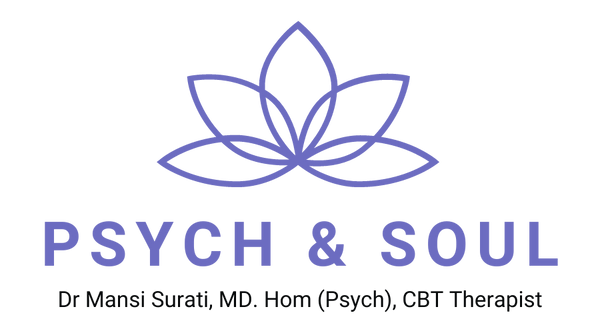
How Self-Help Tools Can Complement Your Mental Health Journey
Share
Mental health is a complex and deeply personal journey, and there's no one-size-fits-all solution for everyone. While therapy and professional help are crucial, self-help tools can serve as a powerful complement to your mental health routine. Whether you’re just beginning to explore ways to manage anxiety and stress or looking for additional resources to support your therapy, self-help tools can empower you to take control of your well-being.

Let’s dive into how self-help tools can enhance your mental health journey and why they are worth considering.
1. Self-Help Tools Offer Immediate Relief
Sometimes, anxiety or stress can hit at the most inconvenient times—during work, while running errands, or even late at night. In those moments, you might not have access to your therapist or the ability to sit down for a long meditation session. That’s where self-help tools come in handy.
Tools like Anxiety Relief Cards provide quick, actionable techniques that you can use to manage your emotions on the spot. Whether it’s a grounding exercise, breathing technique, or mindfulness prompt, these tools are designed for on-the-go use, helping you regain control in just a few minutes.
Quick Tip: Keep a set of Anxiety Relief Cards in your bag or on your desk, so you always have access to stress-relief techniques when you need them most.
2. They Help You Build Healthy Habits
Consistency is key when it comes to improving your mental health, and self-help tools can be a great way to establish daily routines that support your well-being. For example, journaling apps, habit trackers, or mindfulness cards can help you stick to practices that reduce stress and promote calm.
By using these tools regularly, you can build healthy habits that become second nature over time. This is especially helpful if you’re trying to implement the strategies you’ve learned in therapy into your everyday life.
Try This: Use a gratitude journal or a daily planner to track your progress and reflect on your mental well-being each day.
3. Self-Help Tools Empower You to Take Charge
One of the most empowering aspects of self-help tools is that they put you in control. While therapy provides invaluable guidance, self-help tools encourage you to be proactive in managing your mental health. You can use these resources on your own terms, at your own pace, and whenever you feel the need.
These tools aren’t just about “fixing” problems; they’re about helping you develop self-awareness, build resilience, and become more mindful of your thoughts and emotions.
Pro Tip: Incorporate self-help tools into your daily routine for a sense of accomplishment and control over your mental well-being.
4. They Complement Therapy Sessions
While self-help tools are not a replacement for therapy, they are an excellent supplement to it. In therapy, you learn strategies and coping mechanisms for dealing with stress, anxiety, or other challenges. Self-help tools can reinforce those lessons and provide additional support between sessions.
For example, your therapist might recommend mindfulness or breathing exercises as a way to cope with anxiety. Using self-help tools like Anxiety Relief Cards can help you practice those techniques outside of therapy, reinforcing what you’ve learned and deepening your understanding of your emotional landscape.
How It Helps: If you’re working with a therapist, talk to them about incorporating specific self-help tools that align with your treatment plan.
5. They Provide an Entry Point for Those Not Ready for Therapy
Many people feel apprehensive about starting therapy. Whether it’s due to cost, stigma, or simply the fear of opening up, therapy can feel like a big step. Self-help tools provide a gentle, accessible entry point for those who aren’t ready to seek professional help just yet.
These tools allow you to begin your mental health journey at your own pace. As you start using them and see the benefits, you may feel more comfortable with the idea of therapy and other professional support.
Start Here: If you’re not ready for therapy but want to improve your mental health, try starting with self-help tools like meditation apps, mindfulness journals, or Anxiety Relief Cards to ease into the process.
Best Self-Help Tools to Complement Your Mental Health Journey
Looking for practical tools to support your mental health? Here are a few self-help tools that can make a big difference:
-
Anxiety Relief Cards: A deck of 60 easy-to-use cards offering simple strategies to reduce anxiety and stress. They’re portable, effective, and backed by mental health experts.
-
Meditation Apps: Apps like Calm and Headspace provide guided meditations and mindfulness exercises that can help you manage anxiety and practice mindfulness.
-
Journaling Apps: Apps like Day One or paper-based gratitude journals are great for reflecting on your thoughts, setting goals, and expressing gratitude.
-
Habit-Tracking Apps: Apps like Habitica or Streaks help you build and maintain healthy mental health habits, from mindfulness practices to daily walks.
-
Mindfulness Planners: These planners encourage intentional living by incorporating reflection, goal-setting, and self-care into your daily routine.
Self-Help Tools Are a Valuable Part of Your Mental Health Toolbox
Whether you’re already in therapy or just starting to explore mental health, self-help tools offer practical, immediate, and accessible support. They empower you to take control of your well-being, reinforce healthy habits, and provide relief when you need it most.
Remember, mental health is a journey, and self-help tools can help you stay on track. Explore what works best for you, be patient with yourself, and know that every step you take toward prioritizing your mental health is a step in the right direction.
